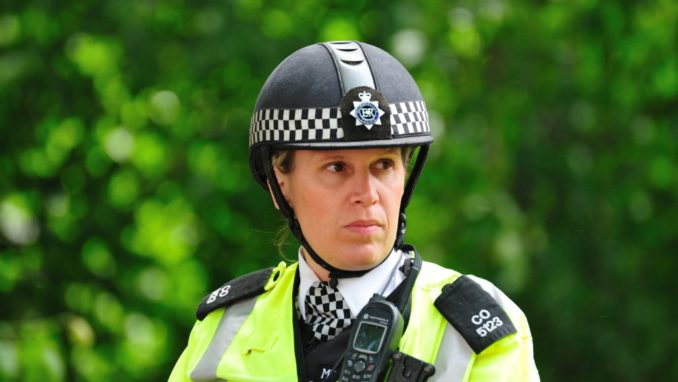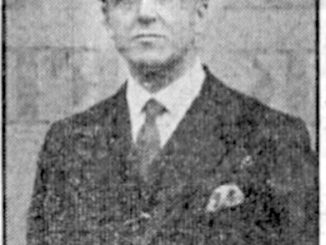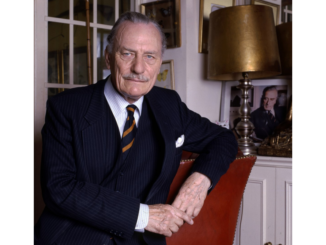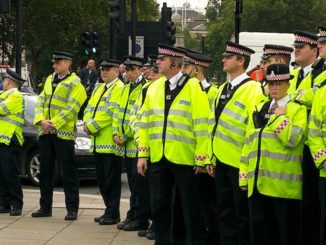
llee_wu – Licence CC BY-ND 2.0
In light of the recent abominable and unprofessional behaviour, during riots and public demonstrations, by members of what used to be a well-respected British police force — together with their now routine displays of a wholesale lack of dignity, respect for the public they used to serve, and dismissive attitude towards that very same public — here I have researched an insight of how it used to be in England not so many decades ago.
The late Captain Sir Percy J Sillitoe K.B.E., [former Chief Constable of Chesterfield (1923–25), East Riding of Yorkshire (1925–26), Sheffield (1926–31), Glasgow (1931–43) and Kent (1943–46) before being appointed Director-General of MI5 (1946–53)] clearly described, in his 1955 autobiography Cloak Without Dagger, his preference for the type of man he believed would make the ideal police constable:
It does not seem to me essential that a police constable should be a man of more than average intelligence or that he is necessarily going to be a better policeman if his standard of education is higher than the next man’s. Indeed I once argued with some passion on this point with Lord Trenchard. Trenchard was called upon by Ramsey MacDonald to deal with corruption in the Metropolitan Police Force and enhance its prestige in the early 1930’s after the case of the notorious Mrs Meyrick and her illegal night clubs. It was his opinion that if university graduates could be induced to join the police force, improved standards of police conduct would automatically result. As an outcome of his belief the Hendon Police College was set up to be a staff college where university and public-school men — together with a small number of special entries of a high standard of education — would be trained for three years to become an “officer” class in the police. These young men were to leave the college with the rank of Station Sub-Inspector. My view was — and still is — that the police force needs not exceptionally high standards of education, but very great integrity of character, combined with the wisdom which comes to some — though not all — men when they have had wide and varied practical experience of human nature. To me, it seemed absurd that these young men should be sent out as the superiors of Superintendents twice their age who often had a great fund of real knowledge acquired through their years of service, and who were now, as a result of this scheme, debarred from any chance of promotion beyond that rank.
After a time, of course, the number of Hendon graduates was found to be heavily in excess of the vacancies available for Station Sub-Inspectors. A few of them did eventually become efficient Chief Constables in the provinces, but Hendon College, as such, did not survive, and I personally feel that it is not to be regretted. I am, of course, in no way deprecating the entry of university graduates into the police force — on the contrary. But I am convinced that a man who has a university degree does not ipso facto make a good policeman; and I am equally sure that there is no way of becoming a good senior police officer other than by starting at the bottom and spending at least a few years doing the work of an ordinary police constable. And here I would like to stress, also, that since many more ordinary constables are needed than senior officers, men who do not aspire to high positions but who are unwavering in their determination to discharge their simple duties conscientiously are no less necessary to the Force than are a smaller number of enterprising and ambitious men who work with rapid promotion in mind.
P. J. Sillitoe,
London
1955
It occurs to me that those in charge of today’s excuse for a rabble that used to be police have either lost sight of, or even have no inkling of, what previously stood for normality in the office of police constable. An ill-thought-out graduate-entry scheme was instigated in 1978. A lot, if not most, of the ills befalling the British police that continues to this day can be directly traced back to that benighted governmental decision. Also, in the same year, the long-awaited elevation in police pay and service conditions (by virtue of the implementation of the recommendations of the Edmund-Davies Review on Police Pay and Conditions) was paid for by the increasingly surreptitious and insidious rise in political control over the police.
No longer is a police constable a citizen, locally-appointed, who derives his authority under the Crown, with a prime remit for the protection of life and property; the prevention and detection of crime; and the prosecution of offenders against the peace. Nowadays they are a scruffily dressed, poorly-disciplined mob who can be recruited from anywhere, preferably holding some worthless minor university degree, and who derive their powers by virtue of political diktat or whim. It seems that nowadays, the possession of a third-class, liberal degree in social sciences or media studies by potential candidates for the constabulary is far more preferable than a solid grounding in criminal law and procedures. How on earth can that be thought to be a good thing?
How many of today’s replacements for proper police constables would survive under the high standards of discipline, well-groomed smartness and devotion to public duty that was expected of the real constables of yesteryear? How would they cope with being on call, twenty-four hours a day, 365 days a year for a paltry pittance of a wage? My guess is that not a single one of the overpaid, ill-disciplined hordes that are an excuse for a law-enforcement agency today would get even close to cutting the mustard. Pounding the beat on the streets of one’s local “patch” and getting to know everyone who lives there has long been the bread-and-butter of good police work. Along with all other things in this “progressive” day and age, it has disappeared forever.
Since the time of the inauguration of the first police force by Sir Robert Peel, in 1829, when he published his Nine Principles of Policing (reproduced, below), the police — members of the public themselves — have always been public servants. This is no longer the case. Political brainwashing by a Left-wing agenda from insurgent establishments of indoctrination such as Common Purpose hold sway. Those former police chiefs of impeccable standing — dinosaurs by today’s “standards” — such as the aforementioned Peel and Sillitoe (among many other well-respected and dedicated public servants) will now be turning — nay: squirming — in their graves.
In particular, Captain Sillitoe’s sound and irrebuttable advice on what makes a good candidate for a policeman, remains uncontestable. Despite him using the language of the time (he only refers to police men and not women officers) he, more than anyone else in the history of the British police, was responsible for championing the recruitment of females into the constabulary. [In 1944 Sillitoe was made the Chief Constable of Kent and he employed Barbara Denis de Vitre to lead the women’s force. When she arrived Kent had two policewomen and the following year there were nearly 150.]
I do not doubt that there are hundreds of decent men and women within the ranks of the British police today who have a great desire to be good police officers and public servants; the majority of them wanting to be out on the streets, engaging with the public and feeling the collars of miscreants. This is the way it always was until the past few decades when the reliance on technology (computers, CCTV etc.) took over from proper old-fashioned beat work. Yes, I accept that modern crime trends must have up-to-date methods of detection, but the fact remains that having streets bereft of a physical and visible law-enforcement presence then a “while the cat’s away, the mice will play” scenario will continue to give great succour to those with malicious intent. A balance has to be reached.
Unfortunately I cannot see any positive changes coming in the not-too-distant future. For far too long now, we have voted in an execrable standard of politician to run the country. Statesmanship has been lost in the mists of time. The Frankfurt School, critical-theory crowd — who have successfully, surreptitiously and insidiously inveigled themselves into every echelon of importance in the country — now hold sway in not just the police but in all other areas of influence and control. Education (especially), the judiciary, health, newspapers, radio, television, industry, the banks, local and regional government are all under the domination of forces alien to the British constitution and way of life. Until measures are taken to wrest back jurisdiction from this malignancy then this unstoppable spiral into moral and social decline will only continue to accelerate.
The British public want, need and desire a publicly-accountable police force to patrol the streets and be effective in protecting them from the rising incidence of crime. What they do not need is a bunch of scruffily-dressed poseur puppets genuflecting in public to rioters and looters whilst, at the same time, serially refusing to investigate the crimes that destroy their lives.
Sir Robert Peel’s Nine Principles of Policing
- The basic mission for which the police exist is to prevent crime and disorder.
- The ability of the police to perform their duties is dependent upon public approval of police actions.
- Police must secure the willing co-operation of the public in voluntary observance of the law to be able to secure and maintain the respect of the public.
- The degree of co-operation of the public that can be secured diminishes proportionately to the necessity of the use of physical force.
- Police seek and preserve public favour not by catering to public opinion but by constantly demonstrating absolute impartial service to the law.
- Police use physical force to the extent necessary to secure observance of the law or to restore order only when the exercise of persuasion, advice and warning is found to be insufficient.
- Police, at all times, should maintain a relationship with the public that gives reality to the historic tradition that the police are the public and the public are the police; the police being only members of the public who are paid to give full-time attention to duties which are incumbent on every citizen in the interests of community welfare and existence.
- Police should always direct their action strictly towards their functions and never appear to usurp the powers of the judiciary.
- The test of police efficiency is the absence of crime and disorder, not the visible evidence of police action in dealing with it.
© A. G. Barstow (former Derbyshire police constable) 2020
The Goodnight Vienna Audio file



